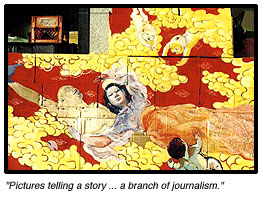|
|

|
 |

 |
1st February 1998
It was customary, in the colonial days, at least, in rural Kelantan, for children
to be adopted either by a rich or an educated uncle or aunt to grow up in the right
environment, and in those days it meant where there was a school nearby.
The family legend had it (confirmed by my mother's mother in 1960) that when my mother
died 40 days after giving birth to me on July 4th, 1937 her dying wish was that I
should be raised by her elder brother who was well off, married but childless. I
was duly given to his care and his wife's. Two years later my uncle and his wife
were blessed with a son who died last year aged fifty eight.
After nine idyllic years in our village, Kampong Bandar, Kok Lanas - Pulai Chondong,
Kelantan, I was, in 1947, sent to live with another uncle in Wakaf Siku, Kota Baru
who was both rich and educated by the period's standards. I was enrolled in Sekolah
Melayu, Padang Garong, and after barely a year there I was selected, following a
common entrance examination and an interview, to study at the Malay College Kuala
Kangsar.
It was quite a cultural shock for me when I arrived at the prestigious MCKK in January,
1948 to join 21 other socalled "bright Malay boys" from throughout Malaya.
Except for half a dozen of us in form 1B everyone was the son of a somebody, whose
father was at least a headmaster of a Malay school.
 In
such a situation, I quickly devised a mechanism for defences and offensives that
survived long after the need for them has gone. The transition from a "country
bumpkin" to a deft and urbane collegian came quickly, surprising even myself.
No pain, no nothing. In
such a situation, I quickly devised a mechanism for defences and offensives that
survived long after the need for them has gone. The transition from a "country
bumpkin" to a deft and urbane collegian came quickly, surprising even myself.
No pain, no nothing.
What I learned during my six years at MCKK did a world of good to me in my various
careers. In my third year I knew sufficient English to enjoy Tom Brown's Schooldays
which even today casts a long shadow over the popular perception of British public
schools.
My two boys Adhha and Fuad attended Oundle in Northamptonshire while my daughter,
Didi, went to Benenden in Kent. My youngest son Fuad had a place at Rugby but he
insisted on going to Oundle (and same House, too!) instead straight away after his
brother had left. All have told me they would send their own children to boarding
schools.
Of course, much has changed since the days of Thomas Arnold's headmastership at Rugby
between 1824 and 1841 but the inculcation of leadership and sense of discipline and
sportsmanship survive as is the case at my alma mater.
I made friends with my contemporaries and spent time doing what every collegian did.
The only difference as my classmates, school mates and teachers would concede, was
I always had a mind of my own and a personal style. I was interested in politics
rather early when others wisely shunned it.
I completed my Form Five in December, 1954 without any qualification other than having
thoroughly enjoyed myself.
What could one do with a Form Five qualification? In an age when MBAs, computer experts
and scientists had not reached Malaya, there was plenty. I became a reporter - but
only after I had gone back to school for another two years.
In the spring of 1957, a stern Mr Harry Miller, (I thought to myself, just like another
unsmiling teacher) the Kuala Lumpur editor of the Straits Times, asked me
to convince him why he should hire me. I shot back: why did you send for me if you
did not think I was a good potential recruit?
I think he was impressed by my lack of trepidation and presumptuousness. Then he
cracked a smile and said: "When can you start?"
Four months before my 20th birthday, I started my working life on a salary of $150
a month. After a six month probationary period I would be paid $260 plus some meagre
perks. However, I was confirmed after only a month! By the time I left for the United
States in October, 1960, my basic salary was $335. |

|
|
|
|